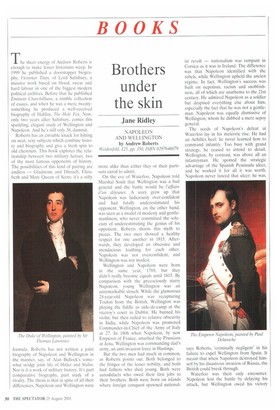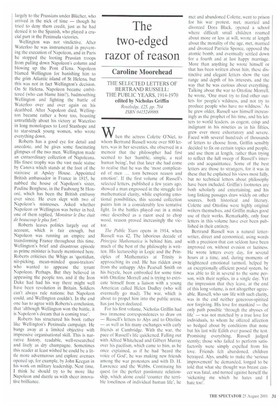Brothers under the skin
Jane Ridley
NAPOLEON AND WELLINGTON by Andrew Roberts Weidenfeld, £25, pp. 350, ISBN 0297646079 The sheer energy of Andrew Roberts is enough to make lesser historians weep. In 1999 he published a doorstopper biography, Victorian Titan, of Lord Salisbury, a massive work based on blood, sweat and hard labour in one of the biggest modern political archives. Before that he published Eminent Churchillians, a nimble collection of essays, and when he was a mere twentysomething he produced a well-received biography of Halifax, The Holy Fox. Now, only two years after Salisbury, comes this sparkling, elegant study of Wellington and Napoleon. And he's still only 38. dammit.
Roberts has an enviable knack for hitting on neat, sexy subjects which combine history and biography and give a fresh spin to old chestnuts. This book explores the relationship between two military heroes, two of the most famous opponents of history. The possibilities of this kind of pairing are endless — Gladstone and Disraeli, Elizabeth and Mary Queen of Scots: ifs a nifty formula. Roberts has not written a joint biography of Napoleon and Wellington in the manner, say, of Alan Bullock's somewhat stodgy joint life of Hitler and Stalin. Nor is it a work of military history. It's part comparative biography, part study of a rivalry. The thesis is that in spite of all their differences, Napoleon and Wellington were more alike than either they or their partisans cared to admit.
On the eve of Waterloo. Napoleon told Marshal Soult that Wellington was a bad general and the battle would be l'affaire d'un clefeuner. A story grew up that Napoleon was ludicrously over-confident and had fatally underestimated his opponent. Wellington, on the other hand, was seen as a model of modesty and gentlemanliness, who never committed the solecism of underestimating the genius of his opponent. Roberts shoots this myth to pieces. The two men showed a healthy respect for one another in 1815. Afterwards, they developed an obsessive and mendacious loathing for each other. Napoleon was not overconfident, and Wellington was not modest.
Wellington and Napoleon were born in the same year, 1769, but they didn't really become equals until 1815. By comparison with the precociously starry Napoleon, young Wellington was an unremarkable slouch. While the glamorous 24-year-old Napoleon was recapturing Toulon from the British. Wellington was playing the fiddle as aide-de-camp at the viceroy's court in Dublin. He burned his violin, but then sailed to relative obscurity in India, while Napoleon was promoted Commander-in-Chief of the Army of Italy at 27. In 1806 when Napoleon, by now Emperor of France, smashed the Prussians at Jena. Wellington was commanding dad's army, an anti-invasion force in Hastings.
But the two men had much in common, as Roberts points out. Both belonged to the fringes of the lesser nobility, and both had fathers who died young. Both were autodidacts who owed their first jobs to their brothers. Both were born on islands where foreign conquest spawned national ist revolt — nationalism was rampant in Corsica as it was in Ireland. The difference was that Napoleon identified with the rebels, while Wellington upheld the ancien regime. In fact, Wellington's success was built on nepotism, racism and snobbishness, all of which are anathema to the 21st century. He admired Napoleon as a soldier but despised everything else about him, especially the fact that he was not a gentleman. Napoleon was equally dismissive of Wellington, whom he dubbed a mere sepoy general.
The seeds of Napoleon's defeat at Waterloo lay in his meteoric rise. He had an Achilles heel: he never learned how to command infantry. Too busy with grand strategy, he ceased to attend to detail. Wellington, by contrast, was above all an infantryman. He spotted the strategic advantage of the Spanish Peninsula ulcer, and he worked it for all it was worth. Napoleon never lanced that ulcer: he was, says Roberts, 'criminally negligent' in his failure to expel Wellington from Spain. It meant that when Napoleon destroyed himself by his disastrous invasion of Russia, the British could break through.
Waterloo was their only encounter. Napoleon lost the battle by delaying his attack, but Wellington owed his victory largely to the Prussians under Blucher, who arrived in the nick of time — though he tried to deny them credit, just as he had denied it to the Spanish, who played a crucial part in the Peninsula victories.
Wellington was not vindictive. After Waterloo he was instrumental in preventing the execution of Napoleon, and in Paris he stopped the looting Prussian troops from pulling down Napoleon's column and blowing up the Pont diena. Napoleon blamed Wellington for banishing him to the grim Atlantic island of St Helena, but this was not in fact Wellington's decision. On St Helena, Napoleon became embittered (who can blame him?), badmouthing Wellington and fighting the battle of Waterloo over and over again on his deathbed. After Napoleon died, Wellington became rather a bore too, boasting untruthfully about his victory at Waterloo in long monologues to Lord Stanhope and to star-struck young women, who wrote everything down.
Roberts has a good eye for detail and anecdote, and he gives some fascinating glimpses of the two men. Wellington made an extraordinary collection of Napoleana. His finest trophy was the vast nude statue by Canova which stands at the foot of the staircase at Apsley House. Appointed British ambassador in France in 1815, he nabbed the house of Napoleon's sister, Pauline Borghese, in the Faubourg St Honore, which has been the British embassy ever since. He even slept with two of Napoleon's mistresses. Asked whether Napoleon or Wellington was better in bed, one of them replied, 'Monsieur le Duc etait de beaucoup le plus fort.'
Roberts leaves politics largely out of account, which is fair enough, but Napoleon was running an empire and transforming France throughout this time. Wellington's brief and disastrous episode as prime minister is barely mentioned here. Roberts criticises the Whigs as 'quotidian, nit-picking, mean-minded quasi-traitors' who wanted to appease the tyrant Napoleon. Perhaps. But they believed in appeasing the people too, and if the Iron Duke had had his way there might well have been revolution in Britain. Soldiers can't always rule nations; but Napoleon could, and Wellington couldn't, In the end one has to agree with Roberts's conclusion, that 'although Wellington won the battle, it is Napoleon's dream that is coming true'.
Roberts has structured his book rather like Wellington's Peninsula campaign. He bangs away at a limited objective with impressive organisational skill. This is narrative history. readable, well-researched and lively as dry champagne. Sometimes this reader at least wished he could be a little more adventurous and explore avenues opened up, for example, by John Keegan in his work on military leadership. Next time, I think he should try to be more like Napoleon and dazzle us with sheer innovative brilliance.



























































 Previous page
Previous page